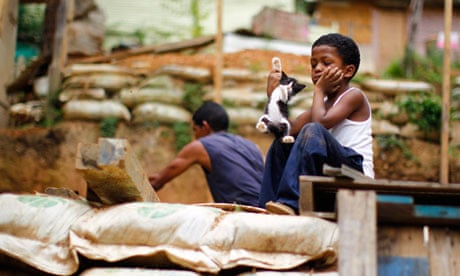The determination of Venezuela under the presidency of Hugo Chávez to push through a Bolivarian-style revolution means the government has plenty on its plate. The Vivienda (housing) part of its ambitious social policy aims to build 2m homes for those on a low incomes by 2017. Opposition parties have condemned this move as an electoral ploy in the run-up to next year's election, in which Chávez plans to run for a fourth term, health permitting. The housing initiative aims to build 153,000 homes this year and another 200,000 in 2012. At the beginning of July, the oil and energy minister Rafael Ramirez reported that 16,964 units had been completed in the first six months of 2011.
The Sambil Candelaria in Caracas was supposed to become yet another massive shopping mall. But at the end of 2008 Chávez expropriated the structure. Since last December it has housed some 2,300 people made homeless during that year's rainy season. "We are leaving soon," says Isaura Sanchez, a mother of four. "My commander will find everyone homes. We saw them on TV and they're almost ready," she adds. About 100,000 families are in urgent need of housing and they are pinning their hopes on the Vivienda initiative.
Caracas is ringed by barrios, or shanty towns built of breeze block and corrugated iron, and served by narrow alleys and steep stairways. The poor in Venezuela are no better off than their neighbours elsewhere in Latin America. Population growth and failures by successive governments have led housing shortages.
"Current estimates suggest we need 3 million units. We should be building 300,000 homes a year. But since Chávez came to power the annual average has been 30,000," says Rafael Uzcategui, of the Provea human rights organisation. "Only President Romulo Betancourt did worse, in the early 1960s." Then the population was seven million; it has since quadrupled.
The present government has made housing a priority, but haphazard policies have hampered construction. There have been 11 housing ministers since 2005.
Town planners estimate that almost half of the capital's urban fabric has been built illegally. The barrios are almost all self-built.
On Avenida Las Acacias, between a plush building and a 25-storey tower block a gigantic sign announces the imminent construction of 146 low-cost homes. The bulldozers are already at work. Three blocks further along, a similar sign indicates another 140 homes. But there is no sign of any work here. Chávez once claimed that "there is room for a second Caracas within the perimeter of the existing city,". But the local authority will find it hard to turn that claim into reality. Public transport is overcrowded, congestion on the roads appalling and power cuts, already common elsewhere in Venezuela, look increasingly likely in the capital.
"We are obviously glad housing has been made a priority," Uzcategui says. "But political determination is not enough. It makes no sense to announce the construction of 2 million new homes with no provision for collective amenities, drains, transport, schools, sports grounds, power lines and such," he adds.
"For years the left criticised technocrats, but it would be good to have a few now. Ideology does not make bricks grow," says a Socialist (PSUV) party militant.
"Two million homes for families of three to four people, means that the government has committed itself to rehousing 6 to 8 million people between now and 2017. It's quite unrealistic," says José Carquez, the manager of a building materials store. One problem is the shortage of materials. "The supply of cement is very irregular and we haven't had any steel bar for about four months. It's only available on the black market, at twice the price," Carquez adds. The nationalisation of the steel industry and cement firms has only aggravated a long-standing problem.
"The state cannot solve the housing crisis on its own," says the head of the Builders Confederation, Juan Francisco Jimenez, who would like to see a public-private alliance.
"Chávez is usually very rude about Venezuelan business leaders, but oddly enough he seems quite happy to deal with much more extreme Russian or Chinese capitalists," says Uzcategui. Dozens of construction contracts have been signed with Russia, China, Cuba, Uruguay and Iran, but as yet there have been few results.
"People are finally going to realise this government is absolutely ineffective," says Teodoro Petkoff, the editor of the opposition daily Tal Cual. "The Vivienda initiative could well have a boomerang effect."
"People who put their names on the housing waiting list are given a government certificate, with the hope of one day having their own home," a Latin-American diplomat explains. "Late next year Chávez will warn voters that if the opposition wins those certificates will be worthless. So people will vote Chávez."
This article originally appeared in Le Monde.
